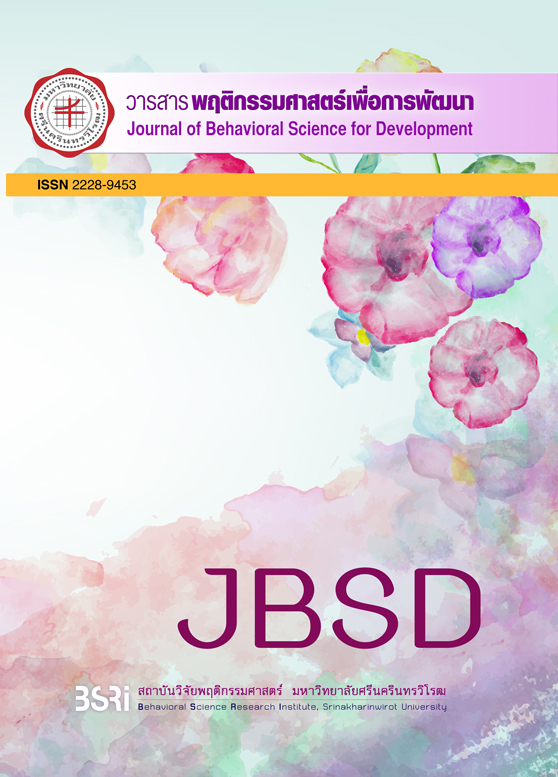Psycho-Social Factors Related to Service Behaviors in Health Promotion of Officers Working in the Universal Coverage Health Security System in Bangkok ปัจจัยทางจิตสังคมที่เกี่ยวข้องกับพฤติกรรมการให้บริการส่งเสริมสุขภาพของ บุคลากรที่ปฏิบัติงานในระบบหลักประกันสุขภาพถ้วนหน้า กรุงเทพม
Abstract
Abstract
This research aims to compare service behaviors in health promotion of officers working in the universal coverage health security system with different biosocial characteristics, to study the psycho-social factors related to health promotion service behaviors in officers who work in the universal coverage health security system, and to study to what extent the psycho-social factors can predict health promotion service behaviors with and without consideration in the biosocial characteristics of the studied officers. The samples which derived from the proportional stratified random sampling method were 191 officers providing health promotion services under the universal coverage health security system in 22 service units located in Bangkok Metropolis. The statistics used for analyzing the acquired data were t-test, pearson’s correlation coefficient and the hierarchical multiple regression (Enter). The research results were as follows. 1) The officers, who had different education levels, had statistically different service behaviors in health promotion. 2) In the combined group, the less than or equal to 40-year-old group, the over 40-year old group, the lower than or equal to the bachelor’s degree group, the higher than the bachelor’s degree group, the non-medical school group and the over 10-year of work experience group, the psycho-social factors were found to positively relate to the health promotion service behaviors of the officers working in the universal coverage health security system (p < .01). 3) The psycho-social factors were generally able to predict the health promotion service behaviors in the people operating in the universal coverage health security system, and able to predict each of the five service behaviors of the officers in the combined group and the specific groups. The two factors, the positive attitudes toward service behaviors in health promotion and the extrovert personality, had statistical significance (p < .01) which affected the behaviors.
Keywords: service behavior, health promotion, universal coverage health security system
บทคัดย่อ
การวิจัยนี้มีจุดมุ่งหมายเพื่อเปรียบเทียบพฤติกรรมการให้บริการส่งเสริมสุขภาพของบุคลากร ที่ปฏิบัติงานในระบบหลักประกันสุขภาพถ้วนหน้าที่มีลักษณะชีวสังคมต่างกัน ศึกษาปัจจัยทางจิตและสังคมที่มีความสัมพันธ์กับพฤติกรรม ฯ และศึกษากลุ่มปัจจัยทางจิตและสังคมในการทำนายพฤติกรรม ฯ ทั้งในกลุ่มรวมและกลุ่มที่มีลักษณะชีวสังคมต่างกัน กลุ่มตัวอย่าง ได้แก่ บุคลากรที่ปฏิบัติงานส่งเสริมสุขภาพในระบบหลักประกันสุขภาพถ้วนหน้า เขตกรุงเทพมหานคร ใน 22 หน่วยบริการ จำนวน 191 คน ใช้สถิติวิเคราะห์ทดสอบค่าที ค่าสัมประสิทธิ์สหสัมพันธ์แบบเพียร์สัน และการวิเคราะห์ถดถอยพหุคูณแบบเชิงชั้น (แบบ Enter) ผลการวิจัยพบว่า 1) กลุ่มระดับการศึกษาที่ต่างกันมีพฤติกรรมการให้บริการส่งเสริมสุขภาพแตกต่างกัน อย่างมีนัยสำคัญทางสถิติที่ระดับ .01 2) กลุ่มรวม กลุ่มอายุน้อยกว่าหรือเท่ากับ 40 ปี กลุ่มอายุมากกว่า 40 ปีขึ้นไป กลุ่มระดับการศึกษาต่ำกว่าหรือเท่ากับปริญญาตรี กลุ่มระดับการศึกษาสูงกว่าปริญญาตรี กลุ่มประเภทขององค์กรแบบไม่เป็นโรงเรียนแพทย์ และกลุ่มอายุงานส่งเสริมสุขภาพมากกว่า 10 ปีขึ้นไป ปัจจัยทางจิตและสังคมทุกตัวมีความสัมพันธ์เชิงบวกกับพฤติกรรมการให้บริการส่งเสริมสุขภาพของบุคลากรที่ปฏิบัติงานในระบบหลักประกันสุขภาพถ้วนหน้า อย่างมีนัยสำคัญทางสถิติที่ระดับ .01 และ 3) กลุ่มปัจจัยทางจิตและสังคม สามารถทำนายพฤติกรรม ฯ โดยรวม และรายด้านทั้ง 5 ด้านได้ทุกกลุ่ม ทั้งในกลุ่มรวมและกลุ่มย่อย อย่างมีนัยสำคัญทางสถิติที่ระดับ .01 และ .05 และเจตคติทางบวกต่อการให้บริการส่งเสริมสุขภาพและบุคลิกภาพแบบแสดงตัว เป็นตัวแปรสำคัญที่มีอิทธิพลต่อพฤติกรรม ฯ อย่างมีนัยสำคัญทางสถิติที่ระดับ .01
คำสำคัญ: พฤติกรรมการให้บริการ การส่งเสริมสุขภาพ ระบบหลักประกันสุขภาพถ้วนหน้า




